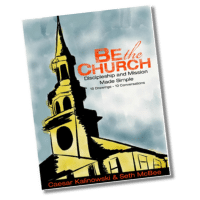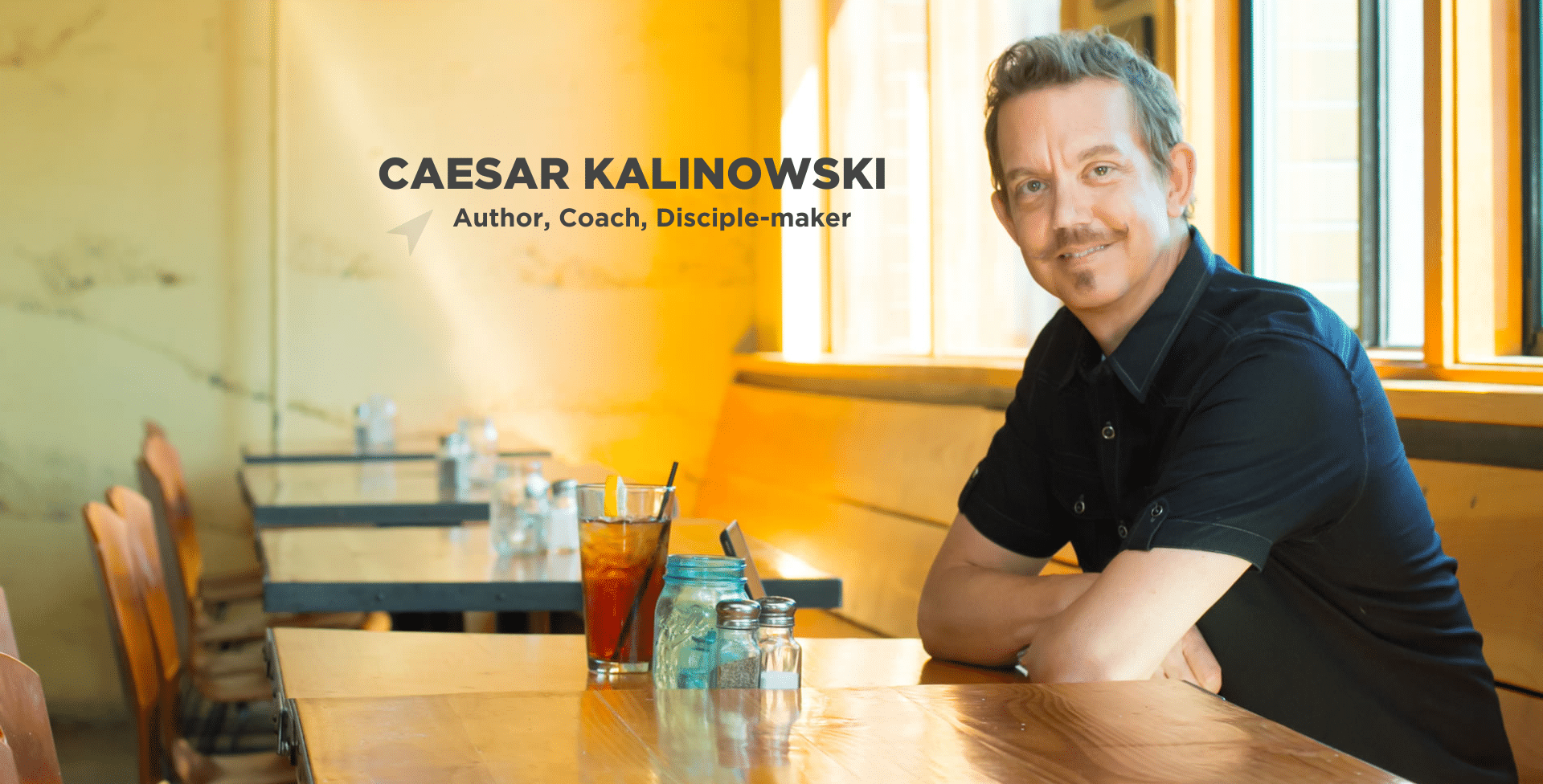
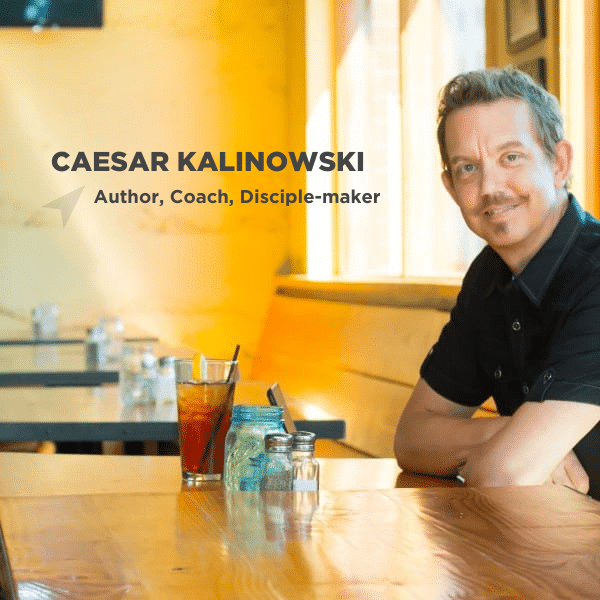
The First Time I Tried Starting a Missional Community I Failed
Have you ever tried starting a missional community from scratch?
“Missional” is a label we give to the qualitative and descriptive aspect of how a church or group of people actually lives. My buddy Hugh Halter says it simply,
“It’s about how much like Jesus people become… how much they influence, woo, and transform the culture in which they are placed.”
A family, group of friends or church that lives like this… Sounds good!
Well, a few years ago my friends all thought so too. We were excited to be rebels who were starting a missional community.
Excited, that is, until things progressed to where we moved beyond our weekly meal and discussion about being missional. It was time to start heading out and building new relationships, serving those in need in our city… actually making disciples.

That’s when everyone recoiled a bit.
Let’s Try This Missional Community Thing Again
Now I’ve learned how to make discipleship and mission a reality–something simple that everyone can live out in everyday life.
What I didn’t know back in those earlier days of starting a missional community was that while most Christians want to make disciples and live on mission with God, they also feel way to busy!
Often, when moving toward a lifestyle of discipleship and mission, people become overwhelmed with what they perceive as the risk of their family time, “margins” and sanity!
The secret is moving from “additional” to “intentional” in our thinking.
Discipleship is not a set of activities we need to jam into our lives, or a series classes that we need to take. And a missional community is more than just a weekly meeting of our small group with a name change.
It’s a series of simple, rhythms or “moves” we can easily, and intentionally, engage in our everyday life. Step by step.

Imagine…
- Making new friendships that naturally lead to “doing life” together.
(I can show you how.) - Or knowing how to talk with others about spiritual things without feeling awkward or pushy.
Discipleship becomes a way of life that includes your kids, close friends and neighbors.
That’s what my family and friends now experience.
If you want it… I’m here to get you started without all the headaches, stop/starts and frustration.
The best part? It’s 7 simple steps.
This process takes a little effort and intentionality. But it’s not complicated. And it’s one of the fastest ways I’ve discovered to get started with others making disciples and building community.
(You can do Steps 1 and 2 today!)
I want to give you access to this free Start-Up Guide (including ‘How To Start a Missional Community From Scratch’). Just click the button below and I’ll send it over.
7 Keys To Staying Unified In Marriage
Very few of us grew up in perfect homes with parents who modeled a flawless marriage. Real intimacy and unity in marriage takes intentionality, growth, and a lifelong commitment to love and bearing with one another.
On this episode of the Everyday Disciple Podcast, Caesar and his wife, Tina, share 7 “secrets” that have helped them stay connected and united through more than 36 years of marriage. You’ll definitely want to take notes!
In This Episode You’ll Learn:
- Why your marriage may be the clearest picture of the gospel others will see
- What date nights can and can’t do for your relationship
- Why getting away without the kids is more important than you think
- 7 secrets that have helped us stay united for the long haul
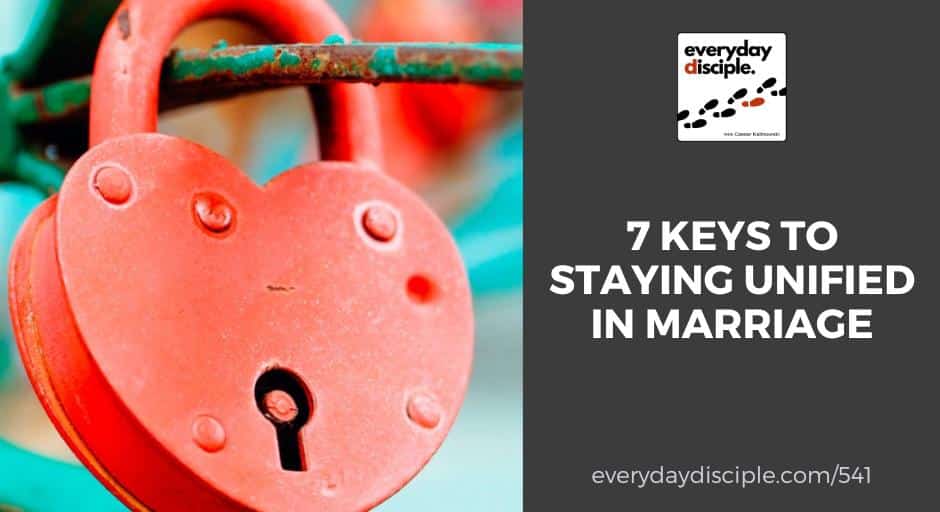
Each week the Big 3 will give you immediate action steps to get you started.
Please check out this new episode and be sure to get this week’s FREE Download of the Big 3.
Your Story…God’s Story
Our favorite singers, songwriters, comedians, preachers, or public speakers all have one thing in common: they know how to tell a good story. And when they finish telling a story I feel connected to it–and them–in some profound way. I can relate in laughter or tears, in agreement or disagreement, but I connect powerfully with the stories they tell.
That’s how it works in the rest of our lives too.
We get to know each other and build friendships by sharing our stories. We are bound together by common themes and the things we have jointly experienced. In fact that is how relationship and community happens…our common stories connect us, and bind us together.
Deep down inside, even if we can’t explain it, we all yearn to be connected to a BIGGER story, to have our lives make a difference and be connected to something more. That is because our lives are all actually part of a much, much larger story. And there is ONE dominant Story that all of our stories will ultimately find their place in and finally be complete because of…that’s God’s Story.
His Story comes before, finishes, corrects, and ultimately makes sense of all other stories.[clickToTweet tweet=”Every part of our own story, and everyone else’s, is actually a reflection of the Story of God.” quote=”Every part of our own story, and everyone else’s, is actually a reflection of the Story of God.”]
Every part of our own story, and everyone else’s, is actually a reflection of the Story of God. That is how God has designed things. Our life story, and all of the little pieces that make it up, actually follow the same pattern found in God’s story throughout the Bible, here’s what that looks like:
CREATION➜FALL➜REDEMPTION➜RESTORATION
That’s a pretty quick 4–scene version of the story found in the Bible.
In order to effectively share who God is, what he’s up to in this world and how he’s changing our life, we must learn how to tell our stories through the lens of this larger Story.
Let me quickly share, in each of these scenes, one question that you’ll need to try and answer as you tell your story:
CREATION: The Key Question here is: Who or What most shaped who you thought you were, and where you got your real value and “identity” in life from?
FALL: The Key Question here is: Why was your relationship with God and others, (and anything else in your life), NOT the way it was supposed to be–like God created it to be? How where you rebelling against God and his ways?
REDEMPTION: The Key Question here is: How has Jesus taken the penalty for your rebellion on himself and how you came to put your faith and trust in Him to redeem and restore your life to the way God intended it to be?
RESTORATION: The Key Question here is: What has changed and what is changing in your life now? AND… Who and what is the focus of your life today?
That should help get you started in the right direction…
One more thing: Unfortunately, often when we Christians tell our stories (usually called “sharing our testimony”) we give very little evidence to the fact that we needed to be rescued and restored by God for his glory and Kingdom purposes. And if we do mention God or Jesus in our story, we’ll probably tell of some experience we had at a church service or youth camp…saying a special prayer… Then we talk about how much better our life is going today. And to tell the truth, we don’t usually make ourselves look that bad, and we don’t make God look all that good. We are the primary focus, the hero in our story, but we’re sorta thankful for God’s help along the way.[clickToTweet tweet=”We must learn to tell our story in a way that God is the hero.” quote=”We must learn to tell our story in a way that God is the hero.”]
However, we can learn to tell our stories in a way that shows God is the hero of the story! and will be both salt and light to others; salty like potato chips–after getting started they’ll want to hear more; and light that illuminates a path toward new life with Jesus. So if you’ve been shy in telling your faith story to others or making yourself out to be better than you really are…the next best time to make your story part of THE story is now.
Here’s a link to a free resource: My Gospel Story that will completely expand on all of this and walk you through creating your own story. I hope that helps. I would love to here your story when you finish it!
[Comments from my old website/blog were not carried over to this new one. Please leave your thoughts below.]
Strategies To Beat Discipleship Procrastination
If you’ve felt like life just keeps getting in the way of living on mission—even with your spouse, kids, or those closest to you—there may be deeper reasons behind your lack of motivation.
This week on the Everyday Disciple Podcast, we’re digging into why we procrastinate and how that hesitation can quietly kill our efforts in discipleship and mission.
In This Episode You’ll Learn:
- The 3 major underlying causes of procrastination
- What procrastination looks like in discipleship and missional living
- How putting off action might be a form of not trusting God
- Ways the gospel speaks to this issue and how to get “unstuck.”
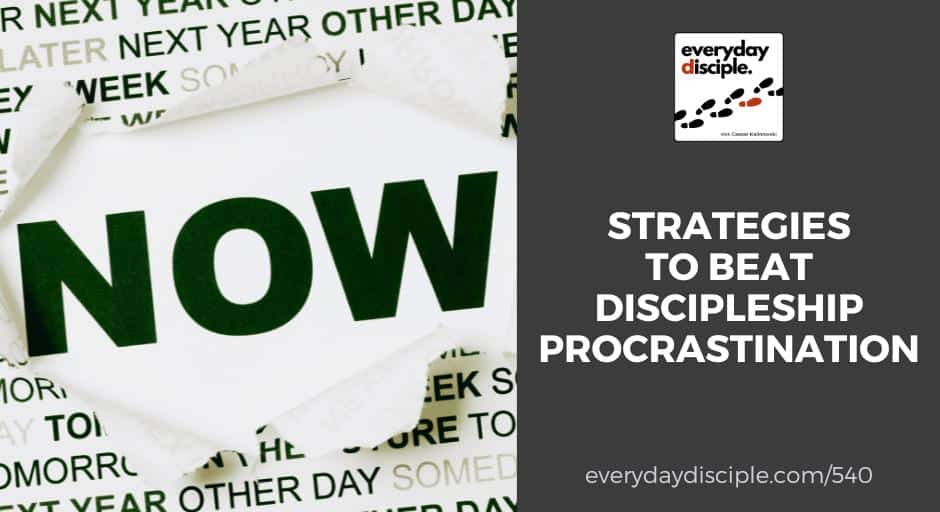
Each week the Big 3 will give you immediate action steps to get you started.
Please check out this new episode and be sure to get this week’s FREE Download of the Big 3.
Family Dinner Night
My wife Tina and I, have for years, been living out our spirituality–our faith–with others in community. I’m not talking about the “church we go to” but rather intentional community with others that’s focused on living like Jesus would live if he were walking around our neighborhood today.
A big part of living like a family with others is eating together, and OFTEN!
As if it is carved into sacred stone, our extended family–we call it our missional community–gets together for a weekly family dinner night.
These collaborative meals are usually simple, sometimes elaborate, often thrown together, but always warm and full of acceptance. It is a needed bright spot in our week and a time when anyone and everyone are invited in everyone is always invited. At times we will take communion together and go around speaking Good News to each other, pushing back the hurts and disappointments of the week and reminding one another of what is now true of us because of Jesus. Afterward, everyone helps clean up, making sure there is no leftover mess.
As a family, we practice an “open door policy” with one another. I know that I can stop by the home or apartment of those in my community at any time and it will be no big deal. It works in reverse too; my friends know that they can stop by our house any time (I’ve noticed that the single guys seem to practice this more around dinnertime).
This may freak you out a little. You may be thinking, “Whoa, how do you have any time to yourself.
What about boundaries?
There have been times when my wife, Tina, and I are sitting on the couch in the evening having a glass of wine together and the doorbell will ring. “Hey, Caesar. Hi, Tina. What are you guys doing tonight?” And I will say, “Hey, Nick, how you doing brother? Tina and I were just sitting here watching this romantic comedy together and I, um, was kind of hoping for a happy ending…if you know what I mean. So unless there is some emergency or you really need us right now, let’s get together tomorrow if that’s cool.”
Because of the openness and trust we have with one another, there is not only the freedom to open our homes, but we also have the freedom to say “Thanks for stopping by, but now’s not a great time.” We all know this and respect this reality.
But sometimes it’s hard!
Living like this could really spin-off in a bad direction if we don’t live with a focus on the Good News and live with intentionality. If my life is all about my comfort and feeding my preferences, then all of that stuff would be frightening and impossible to sustain. But in light of the love we have been shown, it is a pleasure and a blast to live in ways that show what our real, true heavenly Dad is really like.
Sure it would have been great if someone would have shared these ideas with you or led you into this way of thinking and living years ago, but as always, the next best time to begin…is now!
Question: What’s keeping you from hosting a weekly family dinner for your friends and community? If you’re doing it already, what are you experiencing?
From Small Group to Spiritual Family
Living as a family on mission in community with others is a big shift—and a big commitment. It gets even trickier when you’re trying to start or transition a small group that originally formed for reasons other than discipleship and mission.
This week on the Everyday Disciple Podcast, we’re asking the honest question: Why is missional living so hard? We’ll unpack some of the common challenges and give you practical tips, hope, and encouragement for when things feel tough.
Sure, it might feel hard at first… (because it is!). But once you’ve experienced the beauty of gospel-centered community—living like a true spiritual family—there’s no going back to simply checking the church box on Sundays.
In This Episode You’ll Learn:
- The key differences between a traditional small group and a true missional community
- How time, schedules, personal preferences, and priorities shape our ability to live this out
- Why it’s crucial for married couples to be aligned in mission
- What a sustainable, healthy pace looks like for long-term community life
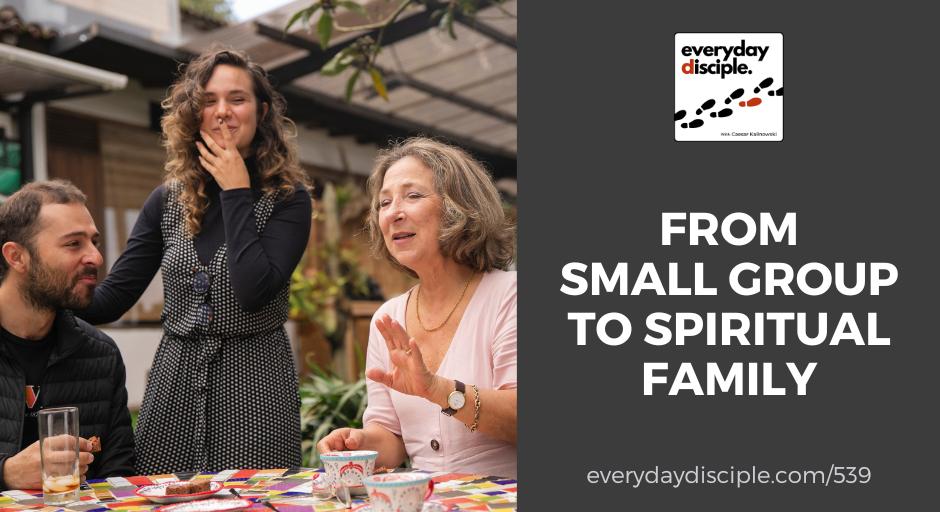
Each week the Big 3 will give you immediate action steps to get you started.
Please check out this new episode and be sure to get this week’s FREE Download of the Big 3.

POPULAR ARTICLES
- GOSPEL FLUENCY: A RELATIONAL GAME-CHANGER!
- WHAT ARE THE (NEW) SIGNS OF A HEALTHY CHURCH?
- SHIFTING YOUR SMALL GROUPS TO VIBRANT MISSIONAL COMMUNITIES
- WHY DADDIES SHOULD DATE THEIR DAUGHTERS
- HOW TO PRAY FOR YOUR CHILD’S FUTURE SPOUSE
- LIFESCHOOL 122: HOW TO CREATE A LIFESTYLE OF DISCIPLESHIP
- ARE YOU WASTING TIME DEVELOPING THE WRONG PEOPLE?
- THESE 3 THINGS ARE TRUE DISCIPLESHIP KILLERS
- STORY OF GOD

ABOUT ME
I am the author of the top selling book, The Gospel Primer. My latest books, Transformed and Small is Big, Slow is Fast came out recently on Zondervan.
I help those with a high commitment to intentional living in the areas of their discipleship, family and mission acquire the leadership skills and tools necessary to succeed and leave a lasting legacy.

